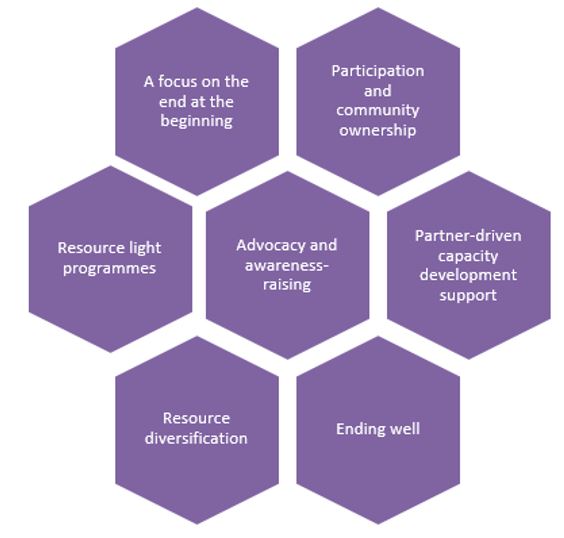By Sarah Lewis and Rowan Popplewell
Development actors love words such as ‘legacy’, ‘impact’ or ‘change’. We like to think (and say) our work prevails long after we are gone. But how many organisations go back after an exit is complete to check? Our explorations of post-closure evaluation tells us not so many.
 EveryChild is one exception. Not only did they develop a set of Responsible Exit Principles to guide and mitigate the impact of their closure, they also commissioned INTRAC to conduct a longitudinal evaluation of the extent to which they achieved their aim of exiting responsibly.
EveryChild is one exception. Not only did they develop a set of Responsible Exit Principles to guide and mitigate the impact of their closure, they also commissioned INTRAC to conduct a longitudinal evaluation of the extent to which they achieved their aim of exiting responsibly.
When we went back to Cambodia, India, Malawi and Nepal up to 15 months after exit, we found a number of partners and programmes continued to have an impact on children’s lives.
In 2020 we will do a follow-up study to assess the extent to which expertise and momentum for change have been sustained five years on from the first stage of the evaluation. In the meantime the evaluation highlighted some steps that international NGOs can consider taking to give their partners and programmes a strong foundation on which to build. These include:
- Focus on the end at the beginning: Start thinking about what your legacy will be (and what you want it to be) as soon as possible. You can then work towards it with partners throughout the programme.
- Ensure participation and community ownership: Activities that communities drive and can easily take on are more likely to survive. In Nepal, REFLECT classes provided an opportunity for communities to come together to discuss problems and jointly identify solutions. Since the end of the project, families have continued to gather and discuss issues.
- Design programmes that are resource-light:
 Programmes that rely on ongoing financial inputs are less likely to be sustainable post exit, particularly in challenging funding environments. In Malawi, activities that required continuing inputs such as the payment of school fees have stopped, whereas those that are less resource-intensive such as Village Savings and Loans Associations are doing well.
Programmes that rely on ongoing financial inputs are less likely to be sustainable post exit, particularly in challenging funding environments. In Malawi, activities that required continuing inputs such as the payment of school fees have stopped, whereas those that are less resource-intensive such as Village Savings and Loans Associations are doing well. - Prioritise advocacy and awareness raising: Programmes that prioritise political, attitudinal or behavioural change continue to have positive effects on children and communities. EveryChild and its local partners in Cambodia (Legal Aid of Cambodia and Khemara) advocated for the creation of a Juvenile Justice Law, which passed in August 2016. This is likely to have a lasting impact on children’s lives.
- Invest in partner-driven capacity development support: Capacity development that is responsive to the needs and demands of partners and focused on their future work with communities will last longer than capacity building for grant management compliance. It can help partners and communities to take responsibility for their future sustainability.
- Support resource diversification: Complete dependency on international resources weakens organisations. In India, two of the ten NGOs that EveryChild supported through its country office have closed. Both were 100% dependent on EveryChild. Organisations that successfully diversified their resources by securing funding from local government and communities were more likely to survive.
- End well: There is no doubt EveryChild devoted a great deal of time, energy and financial resources to the exit process. So as we wrap up Phase II of our work, one question pops up in our minds: was all the effort that went into making exit responsible really worth it? Although it was not always easy, the answer is yes. The evaluation really demonstrates that partners and programmes that are prepared for exit have a greater chance of not only surviving exit, but also thriving from it. Ending well – allowing enough time, ensuing strong communication, and providing sufficient support and resources throughout the process – is critical.
This blog draws heavily on the paper ‘What remains: programming for sustainability’ by Popplewell et al (2016). Other resources relating to this evaluation, including a number of blogs and the synthesis report, can be found on the INTRAC website at https://www.intrac.org/projects/longitudinal-evaluation-everychilds-responsible-exit-process/